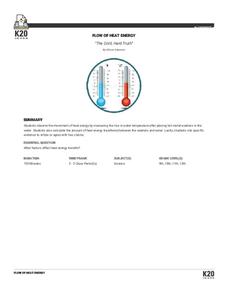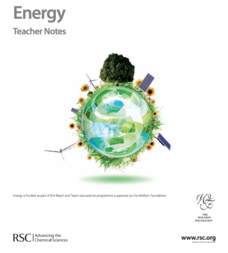Beyond Benign
Enthalpy of Combustion
Learn the facts about types of wax! Partnered pupils determine the enthalpy of combustion for traditional paraffin candles, as well as soy-based candles. The activity focuses on calculations and compares the environmental impact of both...
American Chemical Society
Entropy and Enthalpy Changes
My room isn't messy — it's a scientific experiment in entropy! Scholars investigate entropy, enthalpy, and spontaneity through a guided procedure and set of questions. The lesson connects the Second Law of Thermodynamics, energy transfer...
American Chemical Society
Energy and Entropy of a Stretched Rubber Band
Stephen Perry invented and patented the modern rubber band in 1845. Young scientists put his discovery to work as they use rubber bands to observe entropy and enthalpy. They determine the change in free energy to figure out if it...
American Chemical Society
Exothermic, Endothermic, and Chemical Change
Scientists can't observe bonds breaking or forming, so how do they distinguish between exothermic and endothermic reactions? Young scholars complete two experiments to do just that. They monitor temperature change and calculate the...
K20 LEARN
The Cold, Hard Truth
Things are really getting heated in the lab! Science scholars scope out the facts about heat energy transfer using a simple lab from the K20 Center. Groups collaborate to observe temperature changes between hot metal and water, then use...
Royal Society of Chemistry
Energy—Gifted and Talented Chemistry
What has more energy than a room full of pupils after a fire drill? This lesson plan! Explore the changes in energy during different chemical reactions, discover why some reactions feel cold and others feel hot, and tackle the concept of...
Royal Society of Chemistry
A Reversible Reaction of Hydrated Copper (II) Sulfate
How can removing water change the color of a substance? Lab partners remove the water of crystallization from hydrated copper (II) sulfate, record their observations, then rehydrate the solid. The resource is printable and contains ideas...
Other popular searches
- Enthalpy Change
- Entropy Enthalpy
- Combustion Enthalpy
- Enthalpy of Solution
- Chemistry Enthalpy
- Enthalpy and Entropy
- Bondy Enthalpy
- Standard Bond Enthalpy
- Enthalpy of Combustion
- Enthalpy vs Entropy
- Enthalpy of Formation
- Enthalpy and Enthropy








